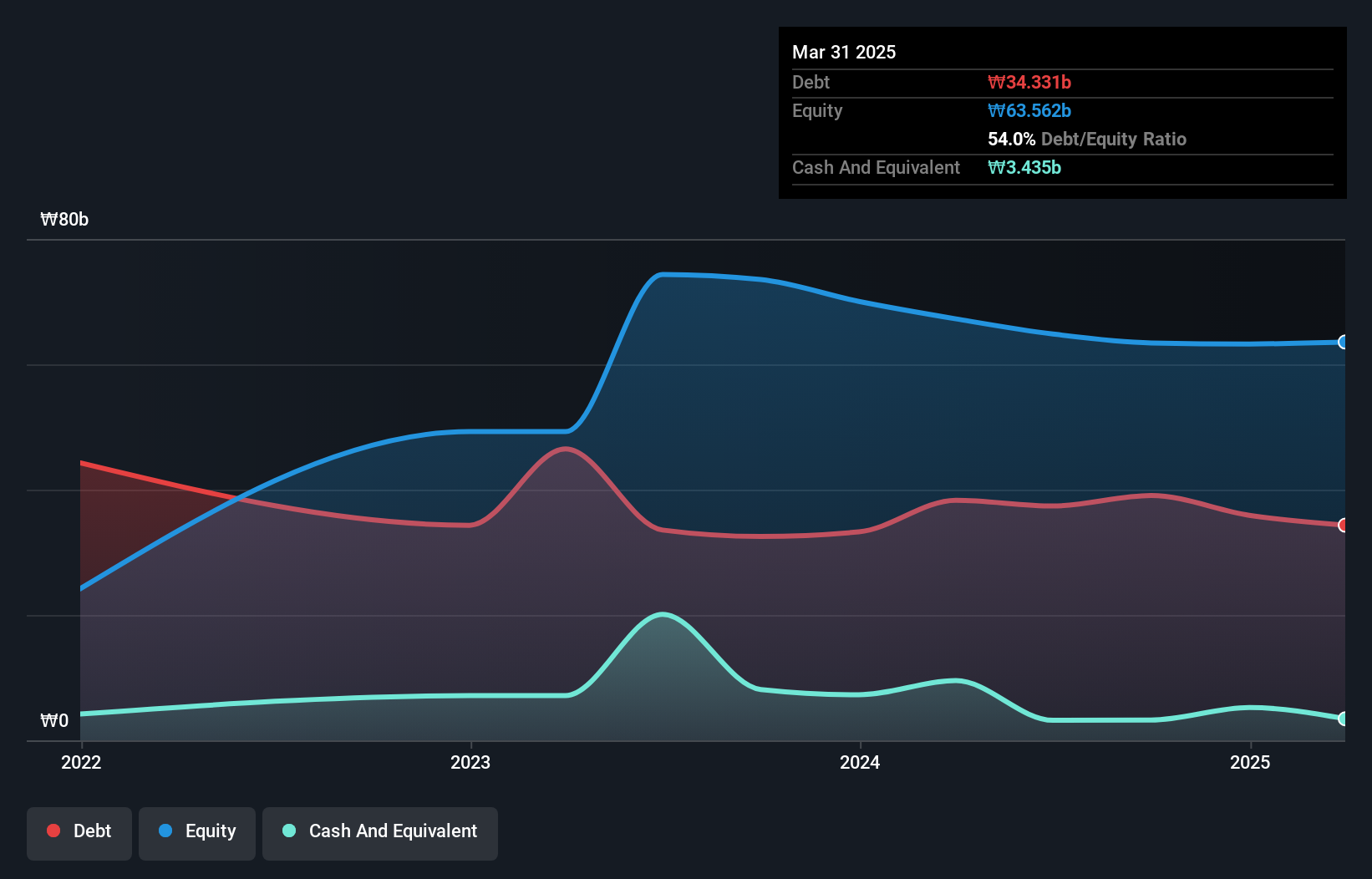
Legendary fund manager Li Lu (who Charlie Munger backed) once said, 'The biggest investment risk is not the volatility of prices, but whether you will suffer a permanent loss of capital.' So it might be obvious that you need to consider debt, when you think about how risky any given stock is, because too much debt can sink a company. We can see that NARA CELLAR Co., Ltd. (KOSDAQ:405920) does use debt in its business. But is this debt a concern to shareholders?
Why Does Debt Bring Risk?
Generally speaking, debt only becomes a real problem when a company can't easily pay it off, either by raising capital or with its own cash flow. Ultimately, if the company can't fulfill its legal obligations to repay debt, shareholders could walk away with nothing. While that is not too common, we often do see indebted companies permanently diluting shareholders because lenders force them to raise capital at a distressed price. Of course, plenty of companies use debt to fund growth, without any negative consequences. When we examine debt levels, we first consider both cash and debt levels, together.
What Is NARA CELLAR's Net Debt?
The image below, which you can click on for greater detail, shows that NARA CELLAR had debt of ₩34.3b at the end of March 2025, a reduction from ₩38.3b over a year. However, it also had ₩3.43b in cash, and so its net debt is ₩30.9b.

How Strong Is NARA CELLAR's Balance Sheet?
Zooming in on the latest balance sheet data, we can see that NARA CELLAR had liabilities of ₩45.3b due within 12 months and liabilities of ₩7.78b due beyond that. Offsetting this, it had ₩3.43b in cash and ₩12.8b in receivables that were due within 12 months. So its liabilities total ₩36.9b more than the combination of its cash and short-term receivables.
When you consider that this deficiency exceeds the company's ₩36.7b market capitalization, you might well be inclined to review the balance sheet intently. Hypothetically, extremely heavy dilution would be required if the company were forced to pay down its liabilities by raising capital at the current share price. There's no doubt that we learn most about debt from the balance sheet. But it is NARA CELLAR's earnings that will influence how the balance sheet holds up in the future. So when considering debt, it's definitely worth looking at the earnings trend. Click here for an interactive snapshot.
See our latest analysis for NARA CELLAR
Over 12 months, NARA CELLAR made a loss at the EBIT level, and saw its revenue drop to ₩80b, which is a fall of 4.8%. That's not what we would hope to see.
Caveat Emptor
Over the last twelve months NARA CELLAR produced an earnings before interest and tax (EBIT) loss. To be specific the EBIT loss came in at ₩3.3b. Considering that alongside the liabilities mentioned above make us nervous about the company. It would need to improve its operations quickly for us to be interested in it. It's fair to say the loss of ₩4.1b didn't encourage us either; we'd like to see a profit. And until that time we think this is a risky stock. There's no doubt that we learn most about debt from the balance sheet. However, not all investment risk resides within the balance sheet - far from it. To that end, you should learn about the 5 warning signs we've spotted with NARA CELLAR (including 2 which shouldn't be ignored) .
If you're interested in investing in businesses that can grow profits without the burden of debt, then check out this free list of growing businesses that have net cash on the balance sheet.
Valuation is complex, but we're here to simplify it.
Discover if NARA CELLAR might be undervalued or overvalued with our detailed analysis, featuring fair value estimates, potential risks, dividends, insider trades, and its financial condition.
Access Free AnalysisHave feedback on this article? Concerned about the content? Get in touch with us directly. Alternatively, email editorial-team (at) simplywallst.com.
This article by Simply Wall St is general in nature. We provide commentary based on historical data and analyst forecasts only using an unbiased methodology and our articles are not intended to be financial advice. It does not constitute a recommendation to buy or sell any stock, and does not take account of your objectives, or your financial situation. We aim to bring you long-term focused analysis driven by fundamental data. Note that our analysis may not factor in the latest price-sensitive company announcements or qualitative material. Simply Wall St has no position in any stocks mentioned.
About KOSDAQ:A405920
NARA CELLAR
Engages in the wholesale of alcoholic beverages in South Korea.
Moderate and slightly overvalued.
Market Insights
Community Narratives


